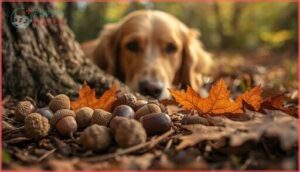This site is supported by our readers. We may earn a commission, at no cost to you, if you purchase through links.
Your dog just snatched an acorn off the ground during your walk, and you’re left wondering if you need to panic or shrug it off. The short answer: acorns from oak trees aren’t safe for dogs to eat, and depending on how many your pup consumed, this could range from a mild stomach upset to a veterinary emergency.
Acorns contain tannins—bitter compounds that protect oak trees from being devoured in nature but wreak havoc on your dog’s digestive system and potentially their kidneys. While one acorn might only trigger some drool or loose stools, a handful can lead to vomiting, abdominal pain, and serious internal damage.
Understanding the real risks, recognizing warning signs early, and knowing exactly what to do can make the difference between a close call and a critical situation.
Table Of Contents
- Key Takeaways
- Are Acorns Safe for Dogs to Eat?
- Why Are Acorns Toxic to Dogs?
- What Are The Dangers of Acorn Ingestion?
- How Many Acorns Are Dangerous for Dogs?
- What Are The Signs of Acorn Poisoning in Dogs?
- Can Oak Leaves and Bark Harm Dogs Too?
- What to Do if Your Dog Eats Acorns
- How is Acorn Poisoning Treated in Dogs?
- How to Prevent Dogs From Eating Acorns
- Are There Safe Alternatives to Acorns for Dogs?
- Frequently Asked Questions (FAQs)
- Conclusion
Key Takeaways
- Acorns contain tannins that cause gastrointestinal distress and can lead to kidney or liver damage in dogs, with toxicity levels varying by dog size (small dogs can show symptoms from just 2-5 acorns, while large dogs may tolerate 15-30).
- Symptoms of acorn poisoning typically appear within 6-24 hours and include vomiting, diarrhea, abdominal pain, and in severe cases, neurological signs like tremors or seizures—requiring immediate veterinary care if your dog shows these warning signs.
- All parts of oak trees (leaves, bark, and acorns) contain toxic tannins, with green immature acorns carrying higher concentrations than mature ones, and moldy fallen acorns posing additional mycotoxin risks beyond standard tannin toxicity.
- Prevention combines training your dog to respond to “leave it” and “drop it” commands, maintaining strict leash control during autumn walks in oak-heavy areas, and regularly clearing fallen acorns from your yard before your dog can access them.
Are Acorns Safe for Dogs to Eat?
No, acorns aren’t safe for dogs to eat. These common fall nuts contain compounds that can make your dog sick, and they present physical dangers beyond just toxicity.
While acorns are dangerous, they’re not the only nuts to watch out for—pistachios can also pose risks to dogs, so it’s worth knowing which snacks are truly safe.
Understanding what’s inside an acorn—and why your dog might be drawn to them in the first place—helps you protect your pet during walks and outdoor time.
Overview of Acorn Composition
Acorns are far more complex than they look. Each one consists of a hard, woody shell protecting a starch-rich kernel inside. That kernel packs carbohydrates, fats like oleic acid, and proteins—fuel meant for the oak seedling’s growth.
But here’s the catch: acorns contain high tannin levels, especially in the bitter brown outer layer. These tannins give acorns their astringent taste and act as a chemical defense against animals. Unfortunately, your dog’s digestive system isn’t built to handle them safely.
Acorns pack high tannin levels that create a bitter taste and act as chemical defenses your dog’s digestive system can’t safely process
Why Dogs Are Attracted to Acorns
Given that acorns pack so much hidden danger, you might wonder why your dog bothers with them at all. The answer lies in natural curiosity and sensory appeal.
Dogs explore the world through their noses and mouths, and acorns hit multiple interest points:
- Earthy scent: Oak trees and damp leaf litter release volatile compounds that draw sniffing dogs in during autumn walks
- Satisfying texture: The hard shell provides oral stimulation and dental scraping sensations some dogs find enjoyable
- Easy availability: Fallen acorns cluster under trees in parks and yards, creating simple grabbing opportunities during outdoor breaks
That mild, nutty flavor doesn’t hurt either—at least before the bitter tannins kick in.
If you’re concerned about acorn toxicity risks to dogs, knowing the signs can help you act quickly.
Why Are Acorns Toxic to Dogs?
The real danger in acorns comes down to chemistry—specifically, the plant compounds oak trees use to protect their seeds. While tannins get most of the blame, they’re not the only troublemakers hiding in those little brown caps.
Let’s break down what’s actually happening inside your dog’s body when they munch on acorns.
Tannins and Their Effects
The bitter punch you taste when biting raw acorn comes from plant polyphenols called tannins—and they’re the primary culprit behind acorn toxicity in dogs. These compounds bind dietary proteins and minerals in your dog’s intestines, reducing nutrient absorption and triggering gastrointestinal upset.
High tannin levels irritate the gut lining, leading to vomiting and diarrhea. With repeated exposure, tannins can stress your dog’s kidneys and liver, potentially causing organ damage if ingestion isn’t addressed promptly.
Other Harmful Compounds in Acorns
Beyond tannins, acorns pack phenolic compounds that irritate your dog’s digestive tract when eaten in quantity. Fatty acid-rich waxes coating the shells prove difficult to digest and can scratch oral tissues.
Residual chlorophyll from green outer skins contributes to stomach upset, while molds on fallen nuts produce mycotoxins that trigger vomiting or dizziness.
In rare cases, heavy metal exposure from contaminated soil concentrates in acorns, threatening liver and kidney function with repeated ingestion—compounding the organ damage tannins already initiate.
Because acorns contain a range of important nutrients and compounds, their risks and benefits have been widely studied for human and animal health.
What Are The Dangers of Acorn Ingestion?
Acorns aren’t just mildly irritating to your dog’s stomach—they can trigger a cascade of serious health problems that range from digestive distress to life-threatening blockages.
The dangers multiply depending on how many acorns your dog ate, their size, and whether the acorns have started to mold. Let’s break down the three main risks you need to watch for.
Tannin Toxicity Risks
When your dog snags an acorn, tannin chemistry kicks in fast. These polyphenolic compounds bind proteins and minerals in the gastrointestinal tract, blocking nutrient absorption and triggering acorn poisoning.
Early signs include vomiting and diarrhea, but since many human foods carry hidden risks—like toxic ingredients in Alfredo sauce—knowing what’s safe can prevent accidental poisoning.
Toxicity levels vary by acorn varieties and canine sensitivity—immature acorns pack higher tannin concentrations. The result? Vomiting, diarrhea, and dehydration as tannin toxicity disrupts gastrointestinal health, with smaller dogs facing heightened risk from even modest exposure.
Choking and Intestinal Blockage
Size matters when swallowing risk enters the picture. Airway Obstruction occurs when whole acorns lodge in your dog’s throat, causing a significant Choking danger, especially for puppies and toy breeds.
Beyond immediate breathing hazards, intact nuts travel into the gut, where Intestinal Blockage develops, triggering vomiting, abdominal pain, and Blockage Symptoms that demand Emergency Response.
Left unaddressed, Digestive Hazards escalate to Intestinal Damage, compromising Gastrointestinal Health and Dog Health. Veterinary Care becomes non-negotiable.
Mold and Additional Hazards
Damp Environments turn fallen acorns into breeding grounds for Fungal Hazards that trigger Mold Toxicity and Gastrointestinal distress far beyond tannin-related Poisoning. Mycotoxin Exposure from moldy nuts amplifies Animal Poisoning risk through Toxic Substances and Pets interactions, while Spore Allergens irritate airways in sensitive dogs.
Three compounding threats emerge:
- Tremors or seizures from neurotoxic mold strains
- Respiratory irritation alongside digestive Toxicity
- Immune compromise from chronic spore inhalation
How Many Acorns Are Dangerous for Dogs?
There’s no universal toxic dose for acorns—every dog reacts differently based on their size, age, and overall health.
Even a single acorn can cause problems for a small dog or puppy, while a larger breed might tolerate a few before showing symptoms. Let’s break down how size and age affect your dog’s risk.
Toxic Dose by Dog Size
How much is too much? The toxic dose of acorns depends heavily on your dog’s weight and the tannin exposure they receive. Smaller dogs face higher acorn toxicity and dog size risks even from just one or two nuts.
Here’s a quick breakdown of toxic dose thresholds and canine health concerns:
| Dog Size | Weight Range | Acorns to Trigger Symptoms |
|---|---|---|
| Small | 5–15 kg | 2–5 acorns |
| Medium | 15–30 kg | 5–15 acorns |
| Large | 30–45 kg | 15–30 acorns |
Acorn poisoning severity increases with repeated tannin exposure, making poisoning prevention and veterinary care essential for dog health and wellness.
Increased Risk for Puppies and Small Breeds
Puppies and toy breeds don’t have the luxury of room for error in regards to acorn poisoning. Their faster metabolism and smaller esophageal diameter mean a single acorn can trigger choking or blockage.
Toxicity prevention starts with understanding that puppy nutrition demands vigilance—immature immune systems increase infection risk from moldy acorns. Small breed care during autumn requires extra canine safety measures.
Even two acorns can overwhelm limited stomach volume, making acorn awareness and veterinary care critical for protecting canine health and ensuring pet safety and prevention year-round.
What Are The Signs of Acorn Poisoning in Dogs?
Recognizing acorn poisoning early can make all the difference in your dog’s outcome.
The symptoms vary depending on how many acorns your dog ate and how sensitive they’re to tannins. Here’s what to watch for after potential acorn ingestion.
Gastrointestinal Symptoms
Your dog’s digestive system reacts quickly to acorn tannins. Vomiting often appears within hours as the stomach tries to expel irritants, sometimes followed by diarrhea that may contain blood.
You’ll notice abdominal pain through hunched posture or whimpering when you touch their belly. Decreased appetite, bloating, and straining to defecate signal gastrointestinal upset that demands your attention—these digestive problems can escalate without proper veterinary care.
Neurological and Systemic Reactions
Beyond digestive upset, acorn poisoning can affect your dog’s brain function and overall system. Systemic inflammation from toxin exposure may lead to kidney damage or liver damage, while neural damage manifests through concerning signs:
- Tremors or unsteady walking indicating compromised coordination
- Lethargy or weakness beyond normal tiredness
- Disorientation or confusion affecting behavior
- Seizures in severe toxic reactions
These toxicity symptoms signal serious acorn poisoning requiring immediate veterinary attention for neurological recovery.
Severity and Timeline of Symptoms
Symptoms usually appear within 6 to 24 hours after ingestion, though symptom onset varies.
Peak severity hits between 24 and 72 hours as vomiting, diarrhea, and abdominal pain intensify—dehydration becomes your biggest concern here.
Some dogs show delayed reactions up to 5 days later, especially with smaller amounts.
Dose impact matters: large quantities escalate symptoms faster than a single acorn.
Can Oak Leaves and Bark Harm Dogs Too?
Acorns aren’t the only part of oak trees that can make your dog sick.
Oak leaves and bark also contain tannins, which means your dog can experience poisoning symptoms even without touching a single acorn.
Let’s look at what makes these tree parts dangerous and when you should be most concerned.
Toxins in Oak Tree Parts
Oak trees harbor several toxic compounds beyond the acorns themselves. The entire Quercus family produces tannins that create gastrointestinal risks when your dog nibbles leaves, bark, or buds.
Here’s what you need to watch for during toxic plant identification:
- Oak leaves contain phenolics that irritate the digestive tract
- Bark holds gallotannins that persist in the gut after ingestion
- Leaf litter accumulates tannins as it decomposes
- Red oak species usually have higher toxic compound concentrations
- Both fresh and dried plant material can cause oak toxins poisoning
These tannin effects mean acorn poisoning isn’t your only concern.
Risks of Green Vs. Mature Acorns
When you spot immature nuts on the ground, remember that green acorn risks escalate beyond the dangers mature acorns pose. Green acorns carry higher tannin levels that increase acorn toxicity and stomach upset. Their tough shells also wear down teeth more aggressively.
Mature acorn dangers center on choking hazards from hard shells and mycotoxin exposure if mold develops. Both types impair nutrient absorption and trigger acorn poisoning, but green nuts pack more punch per bite in terms of tannins and quercus poisoning.
What to Do if Your Dog Eats Acorns
If your dog snags an acorn before you can stop them, don’t panic—but don’t wait around either.
The next few minutes matter, and knowing what to do can make all the difference between a minor scare and a vet emergency. Here’s exactly how to respond, step by step.
Immediate At-Home Steps
If your dog grabs an acorn, stay calm—panic won’t help either of you. First, gently remove any acorns still within reach and check your dog’s mouth for debris. Offer fresh water to help dilute tannins, but don’t force it if they’re coughing or gagging.
Never induce vomiting without vet guidance; it can worsen things. Note how many acorns were eaten and when. Monitor closely for vomiting, drooling, or abdominal pain—these emergency pet care signs matter.
When to Call The Veterinarian
When should you escalate from watchful waiting to veterinary guidance? Certain urgent symptoms demand immediate emergency care:
- Severe vomiting or diarrhea lasting over 24 hours—signs of progressive acorn poisoning requiring veterinary care and advice
- Difficulty breathing, blue gums, or collapse—life-threatening reactions needing emergency pet care
- Suspected poisoning or toxic ingestion—contact your veterinarian or poison control immediately
- Deep wounds, seizures, or unresponsiveness—go straight to emergency services
Trust your instincts. A vet consultation beats waiting when doubt creeps in.
How is Acorn Poisoning Treated in Dogs?
When your dog ingests acorns, your veterinarian will tailor treatment based on how much was eaten, when it happened, and what symptoms are present.
The approach can range from simple monitoring to more aggressive interventions like induced vomiting or hospitalization. Here’s what you can expect during veterinary treatment for acorn poisoning.
Veterinary Diagnostic Methods
When you rush your dog to the clinic, the veterinary team will likely start with imaging techniques like radiography or ultrasonography to spot intestinal blockages or organ damage.
Lab testing—complete blood counts and serum biochemistry panels—reveals kidney stress or dehydration from poisoning. In emergency veterinary care situations, toxicology screens and diagnostic medical radiology help pinpoint the severity and guide treatment in veterinary medicine.
Common Treatment Options
Once toxicity tests confirm acorn poisoning, your veterinarian will deploy emergency response measures through a customized treatment plan. IV fluids protect kidney function and correct dehydration—your dog’s lifeline during gastrointestinal issues.
Activated charcoal may limit toxin absorption if you arrived quickly. Anti-emetics control vomiting, while analgesics ease abdominal pain.
There’s no antidote for toxic nuts, so emergency veterinary care focuses on supporting your dog’s body through recovery strategies.
Monitoring and Recovery
Your vet will track recovery metrics carefully after acorn poisoning treatment begins. Post exposure care includes daily symptom tracking—monitoring vomiting patterns, dehydration levels, and gastrointestinal issues as your dog rebounds.
Key monitoring steps include:
- Repeat toxicity testing within 24-72 hours to assess kidney and liver function
- Recording fluid intake and output to prevent dehydration
- Scheduling veterinary followup visits at 7-14 days post-treatment
- Watching for delayed symptoms like lethargy or appetite changes
- Documenting recovery milestones to adjust supportive care protocols
How to Prevent Dogs From Eating Acorns
The best defense against acorn poisoning is stopping your dog from eating them in the first place. This means combining smart training, careful supervision during walks, and practical changes to your outdoor spaces.
Here’s how to create a safer environment for your dog during acorn season.
Training Leave It and Drop It
Teaching your dog “Leave It” and “Drop It” is your best defense against acorn poisoning. Start command training with low-value items, rewarding immediately when they ignore or release the object. Cue consistency matters—use the same words and gestures every time.
As your dog’s obedience improves, gradually increase temptation. These reward systems are fundamental behavior modification tools for toxic nuts and acorn poisoning prevention.
Safe Walking Practices During Acorn Season
Once your dog reliably reacts to commands, it’s time to apply those skills outdoors. During autumn hazards for pets season, leash control becomes your primary tool for dog walking safety.
Keep your dog on a short lead in high-risk zones—this enhances dog monitoring and prevents sudden lunges toward acorns. Stick to well-maintained paths where acorn removal is routine, and inspect the ground ahead for paw protection.
Trail safety and yard safety work hand-in-hand to prevent acorn poisoning.
Reducing Access in Your Yard
Beyond the sidewalk, your own backyard may host autumn hazards for pets. Start with a 6-foot fence installation and gate security using self-closing hinges and locking latches to contain your dog. Yard cleanup matters—collect acorns weekly during oak season, and consider plant barriers like dense holly to block access.
Outdoor lighting improves yard safety and pet safety by illuminating potential wildlife hazards.
- Install a tall privacy fence with secure, self-closing gates
- Remove acorns and fallen debris weekly during autumn
- Plant dense hedges like holly to create natural barriers
- Add motion-activated lighting to monitor nighttime activity
Are There Safe Alternatives to Acorns for Dogs?
Your dog doesn’t need acorns to satisfy their chewing instincts or curiosity. There are plenty of safer options that won’t put their health at risk.
Let’s look at what you can offer instead, what makes a good distraction, and which foods to keep off-limits entirely.
Recommended Dog-Safe Treats
Your best defense against acorn temptation? Real meat treats with under 5 calories per piece make perfect training rewards.
Fresh, grain-free options using chicken or turkey support canine nutrition without artificial additives.
For safe chews, try freeze-dried jerky or dental treats with prebiotic fibers. These healthy snacks deliver pet wellness benefits while keeping your dog focused on natural rewards—not toxic foods lurking in the yard.
Durable Chew Toys and Distractions
When chew therapy means redirecting your pup from seasonal hazards, high-density rubber toys with treat compartments win every time. These interactive play tools satisfy natural gnawing instincts while promoting safe chewing habits.
Look for textured surfaces that scrub teeth as your dog works—vet-approved dog distractions that protect against acorn poisoning and reinforce pet owner responsibility during autumn walks.
Foods and Tree Nuts to Avoid
Macadamia nuts top the toxic food list—even small amounts trigger weakness, tremors, and hyperthermia in dogs. Black walnuts harbor mold toxins, while pecans and hickory nuts carry tannins similar to acorn poisoning risks.
Grapes, raisins, and xylitol-sweetened products cause severe organ damage. Skip almonds and pistachios too—their high fat content disrupts canine nutrition and diet, leading to pancreatitis and hazardous plant complications.
Frequently Asked Questions (FAQs)
Are acorns from oak trees toxic to dogs?
Yes, acorns from oak trees are toxic to dogs. The tannins inside cause gastrointestinal upset, and whole acorns create choking or blockage risks—particularly dangerous for smaller breeds and puppies.
How long does it take for acorn poisoning to affect dogs?
Signs of acorn poisoning usually appear within two to six hours after ingestion, though severe liver or kidney damage may take two to five days to become evident in dogs.
Do all oak tree species produce toxic acorns?
Not all oak species carry the same risk. Red oaks generally contain higher tannin levels than white oaks, making their acorns more dangerous.
Regional factors and acorn maturity also influence toxicity levels substantially.
Are acorn caps as dangerous as the nuts?
In terms of acorn cap risks, don’t put all your eggs in one basket—caps carry far less tannin than the actual nut, making capsule toxicity minimal compared to swallowing the seed’s concentrated toxic nuts and tannins that trigger serious acorn poisoning.
Can acorn toxicity be detected through blood tests?
Blood test analysis can reveal acorn poisoning through elevated liver enzymes (ALP, ALT) and kidney markers (creatinine, BUN).
Veterinary diagnosis also detects electrolyte imbalances and inflammation, confirming tannin toxicity without directly measuring tannic acid.
How long do tannins stay in a dogs system?
Tannins usually transit through your dog’s digestion process within 8 to 24 hours, though tannin absorption peaks at 2 to 6 hours post-ingestion.
Metabolism effects and elimination rate vary with individual gastrointestinal health in dogs.
Conclusion
So can dogs eat acorns from oak trees? Absolutely not. What seems like harmless backyard foraging can spiral into kidney damage, blockages, or worse.
Your vigilance during fall walks, paired with solid training and a quick hand on the leash, keeps your dog safe from this preventable danger. If acorns hit the ground, assume your pup will find them—and stay one step ahead. Their health depends on your awareness, not their judgment.
- https://www.merckvetmanual.com/toxicology/quercus-poisoning/quercus-poisoning-in-animals
- https://www.fda.gov/animal-veterinary/animal-health-literacy/aflatoxin-poisoning-pets
- https://en.wikipedia.org/wiki/Tannin
- http://countrysideportjeff.com/content/acorn-toxicity-dogs-rake-acorns-asap
- https://www.theguardian.com/science/2015/oct/21/plantwatch-simons-oaks-acorns-spring-flowering-pollination-climate-change?utm_source=chatgpt.com


















